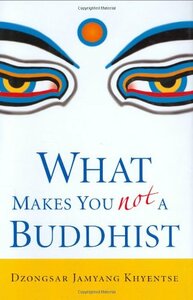Take a photo of a barcode or cover
Okay this book is so short I read it without even adding it to my book list. The book is great it focuses really directly on the four seals. Here are some great things from the book:
"Not just a few Christians and Muslims feel passionate about converting heathens to escape hell-fire and damnation, while the existentialists zealously try to convert the religious into heathens." -44
"Buddha doesn't want Jack to be caught in a personal 'Hell,' but he can't tell Jack to work with his perceptions and aggression either because Jack is an idiot. So for Jack's sake, Buddha teaches that there is an external hell and that in order to avoid going there and being boiled in molten iron, Jack must stop entertaining his nonvirtuous, negative actions and emotions" -75
"Not just a few Christians and Muslims feel passionate about converting heathens to escape hell-fire and damnation, while the existentialists zealously try to convert the religious into heathens." -44
"Buddha doesn't want Jack to be caught in a personal 'Hell,' but he can't tell Jack to work with his perceptions and aggression either because Jack is an idiot. So for Jack's sake, Buddha teaches that there is an external hell and that in order to avoid going there and being boiled in molten iron, Jack must stop entertaining his nonvirtuous, negative actions and emotions" -75
A teacher once wrote,
"In the garden of gentle sanity
May you be bombarded by coconuts of wakefulness."
Here be coconuts.
"In the garden of gentle sanity
May you be bombarded by coconuts of wakefulness."
Here be coconuts.
I'm depating whether or not to give this whole 3 stars. What Makes You Not a Buddhist is a good way to get to know the 4 buddhist principles but I see a lot of judgement in the way they have been presented. For somebody else this book may do the magic though I'd still recommend Darryl Bailey's Essence Revisited over this one!
So, a true Buddhist:
- believes in mystical nonsense like "nirvana is beyond concepts" and reincarnation and that Buddha was capable of flying.
- believes in profound-sounding mumbo-jumbo like "all composite things are impermanent".
- believes that "One of the main effects of science and technology has been to destroy the world more quickly." (Never mind all the suffering that vaccines, penicillin, and anaesthetics have prevented, or that the world has never been so peaceful and prosperous.)
- believes that "Because of greed, jealousy, and pride, the economy will never become strong enough to ensure that every person has access to the basic necessities of life" and that if "every nation and individual truly lived Mao Tse-tung's pragmatic communist philosophy ... we would be perfectly happy." (Never mind that 30 million people starved to death under Mao's Great Leap Forward.)
- believes that it's ok to live off other people's charity, without producing anything.
So, Buddhism is a philosophy of mystical, fatalistic Maoists. Fair enough: happily not a Buddhist then.
- believes in mystical nonsense like "nirvana is beyond concepts" and reincarnation and that Buddha was capable of flying.
- believes in profound-sounding mumbo-jumbo like "all composite things are impermanent".
- believes that "One of the main effects of science and technology has been to destroy the world more quickly." (Never mind all the suffering that vaccines, penicillin, and anaesthetics have prevented, or that the world has never been so peaceful and prosperous.)
- believes that "Because of greed, jealousy, and pride, the economy will never become strong enough to ensure that every person has access to the basic necessities of life" and that if "every nation and individual truly lived Mao Tse-tung's pragmatic communist philosophy ... we would be perfectly happy." (Never mind that 30 million people starved to death under Mao's Great Leap Forward.)
- believes that it's ok to live off other people's charity, without producing anything.
So, Buddhism is a philosophy of mystical, fatalistic Maoists. Fair enough: happily not a Buddhist then.
informative
reflective
slow-paced
Honestly this guy was super annoying. I respect Buddhism but it is definitely not for me. At least, not the way Khyentse describes it. He makes wild generalizations about the modern world, and I couldn’t follow his “easily digestible” analysis of the 4 truths. There are definitely some statements he can’t back up. It was far easier for me just reading Siddhartha in high school.
I'm currently at page 25, and already encountered a mountain of factual inaccuracies, which makes me wonder about the ability of Khyentse to think critically. I much preferred reading Mathieu Ricard's books.
However, it might be a good introduction, if one doesn't care about the veracity of facts too much.
Now having finished it, it's an ok book mostly.
However, it might be a good introduction, if one doesn't care about the veracity of facts too much.
Now having finished it, it's an ok book mostly.




